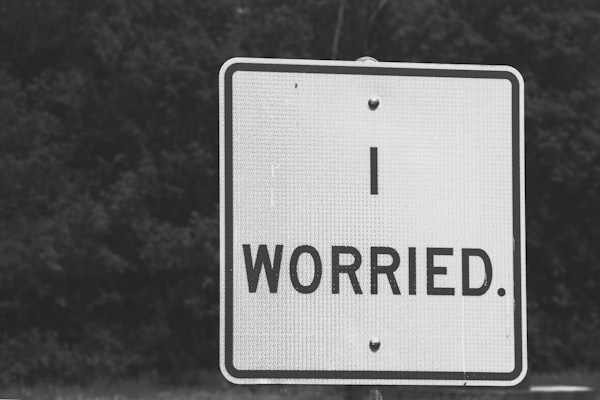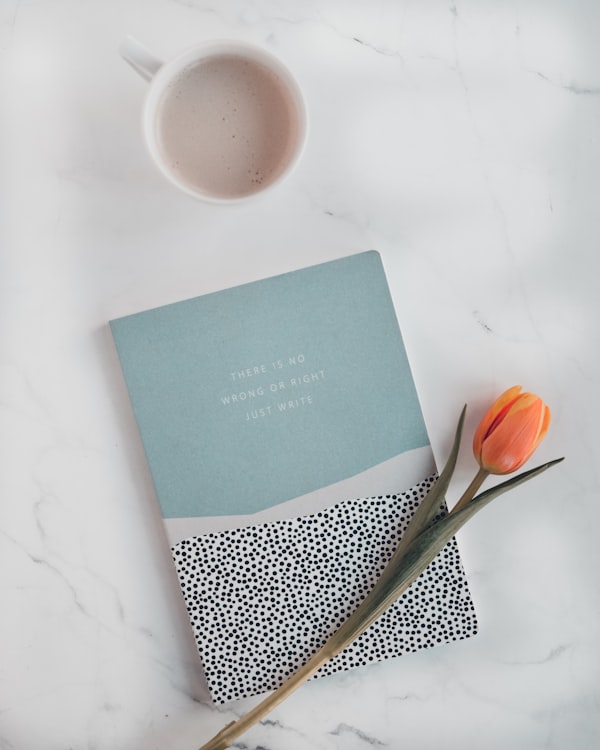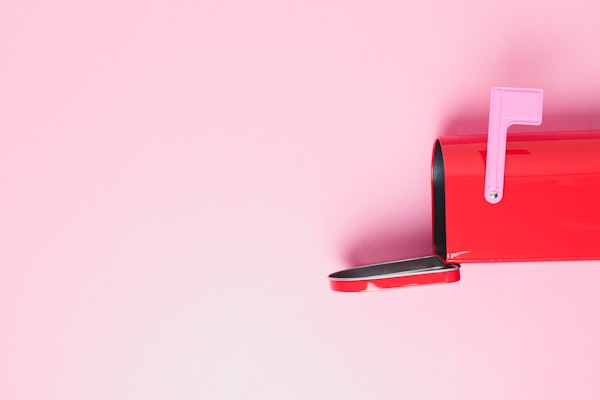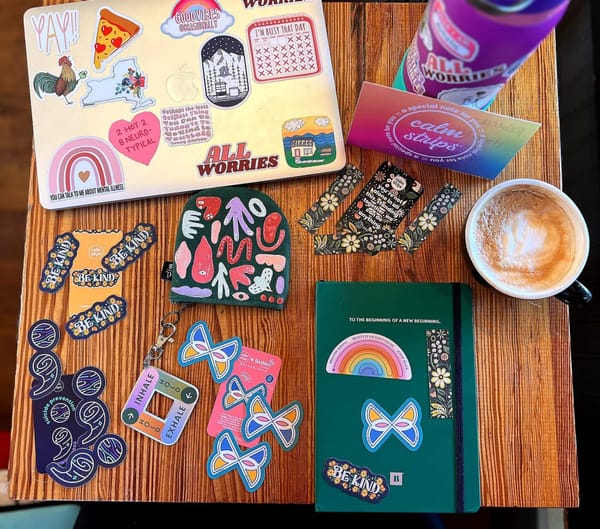Sam Kearney: Masking - Not Just for Pandemics!
Artist and Small Business Owner Sam Kearney opens up about what it feels like to mask their true personality.
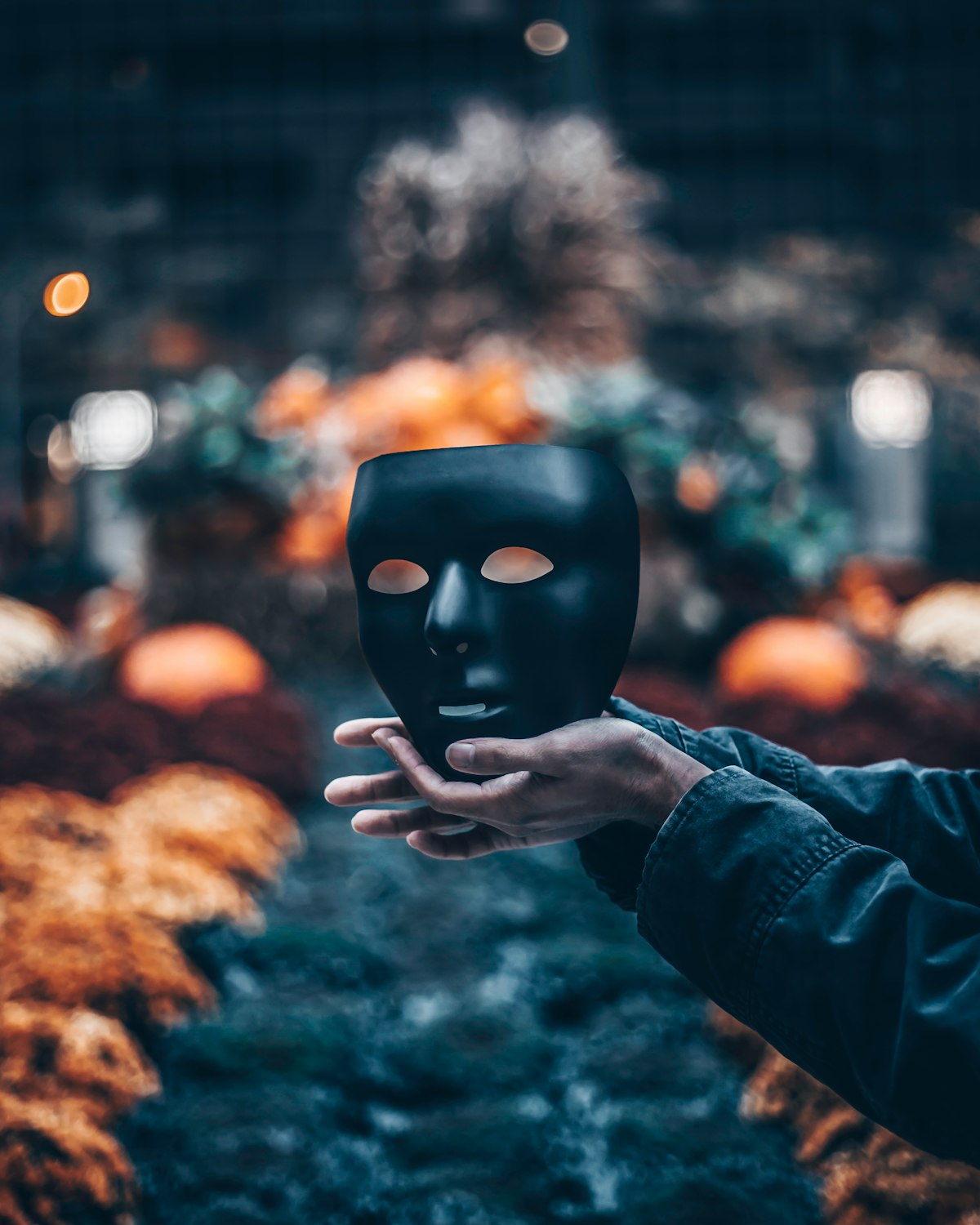
Today, I’m featuring a guest post written by my good friend Sam. Sam and I met on Instagram and have become close over the years. They are a talented artist and singer and I’m honored that they agreed to write a guest post for me about how they've navigated through life leading up to and since their recent Autism diagnosis.
When I first published Sam's guest post, I knew very little about Autism, including the fact that I am actually Autistic. I definitely didn't know that all the "rules" surrounding the terminology inside and outside of the Autistic community (AKA language preferred by Actually Autistic individuals vs. Professionals/Caretakers in the field).
I mention this because in her post, Sam talks about their Aspergers diagnosis: a diagnosis that is no longer is no longer recognized by the DSM. Until 2013, Asperger Syndrome was a separate diagnosis from Autism. Since being from the DSM, individuals who might have received an Aspergers diagnosis have been diagnosed Autistic instead. Sam knows about this change in terminology yet they feel most comfortable referring to their diagnosis as such. And that's their prerogative.
As Autistic people, we undergo constant pressure to exist the "right" way in the world. Nearly two years since my own diagnosis, I have formed my own preferences and opinions about the language I use. While I prefer identity-first language to person-first language – I'm an Autistic person, not a person with Autism – I believe each individual has the right to refer to their diagnosis with whichever terminology makes them feel the safest and most comfortable.
When someone decides to share something personal about their life with you, it means that they trust you to respect and validate their lived experience; not tell them that they are wrong about who they are.
As always, thank you for reading!
♥︎♥︎♥︎

Masking: Not Just for Pandemics!
by Sam Kearney
Hello! My name is Sam, I’m 33 years old, I’m an artist, and four years ago I was diagnosed with Aspergers (which yeah, that term is no longer recognized by the DSM as a standalone term, but it’s a bit more specific than just saying “autism spectrum”).
Learning to Mask from a Young Age
Before jumping into things, I’d like to share a little background info. I’ve been a lifelong lover of and participant in the arts. While my focus has been digital illustration and graphic design as of late, I was most certainly a textbook “theatre kid.” I remember being in choir in the 7th grade, hearing that the local high school needed younger singers for their production of The Music Man. So I auditioned, was cast, and had my eyes opened to the magic of performing arts.
From then on, any time I caught word of a show, I was there, actor’s resume in hand. By the time I graduated high school, I had auditioned 17 times and was cast 15 (most often as the villain or comedic second fiddle, never the archetypal leading lady). I loved losing myself in these characters whose lives were so very different than my own. I knew that acting was very important to me, but it would be over a decade before I realized the significant impact it would have on my life.
So, what does geeking out over Rodgers and Hammerstein have to do with Aspergers? It allowed me to understand human emotion more deeply. It gave me a safe space to explore common relationships and situations with clear direction. It also gave me a lifelong coping technique called masking.
What Is Masking?
Masking is basically what it sounds like: putting on a face or character in order to move through the neurotypical world with as little unease as possible. It’s a survival tactic that can be traced back to our nomadic days: either blend in with the tribe or be ostracized and eaten by a sabertooth tiger.
At the surface level, masking sounds disingenuous: denying people the experience of getting to know the “real you,” sometimes putting yourself through a bit of discomfort in order to not rock the boat. Maybe it even seems like it’s outright lying.
For me, it was the only way to exist. Without realizing it, I would create a character for any area of my life that I was struggling with. I had a character for waiting tables, with a “rolodex” of phrases that I’ve accumulated over the 13 years of working in the industry. I had a character for when I was representing my business, who was confident, strong, and charming. It’s not like I didn’t have these qualities within me, it’s that I was making a conscious choice to present only those qualities at any given moment.
As a biological woman, masking is easier for me than my male counterparts because of how women are raised in American society. There’s a pretty clear blueprint of what the ideal woman looks like and how she should behave. Sit straight, don’t fuss, be sweet, play nice, don’t cry, don’t eat too much, don’t be weird. Boys will be boys, but girls have a slew of expectations.
The Problem With Masking
With any mask, after wearing it a while, it becomes uncomfortable. Masking requires a ton of energy and focus to pull off correctly. There are days where it’s seamless, and there are days where it’s more like the Edgar Suit from Men in Black.
As I navigate this mental health journey and am bombarded with the same major shifts and changes that we’ve all experienced this past year, I find that the mask often crumbles into dust and slips through my fingers before I can even raise it to my face. It’s harder and harder to only show the best I have to offer and hiding the less savory personality traits: too loud, too emotional, reacts poorly in new situations, too weird, self-absorbed, too much. No one is at their best right now; it’s perfectly understandable.
Taking Off The Mask
So I just let it out. I don’t try to hide it anymore. It’s exhausting to live inauthentically for long periods of time, and frankly, I just don’t have the energy. This doesn’t mean I’m giving myself carte blanche to be obnoxious or selfish or rude. It means that I trust myself enough to know that nothing is coming from a place of malice. I trust myself to do the right thing, even if that’s not the first thing I do. I trust that all the good things about me will shine brighter than the not-so-great things. And if I’m wrong, I trust my friends, family, and community to have my back, and not tie me to a horse and send me out to the woods, never to return.
Is masking harmful? I think like most things, in moderation, it’s fine. I think it’s important to heed the words of Mufasa, “remember who you are.” None of the masks I wore were too far off from who I actually am: a smart, sweet, earnest, possibly too sensitive creative who has an obnoxiously bubbly personality and likes to create works that make people smile (and is definitely too loud).


